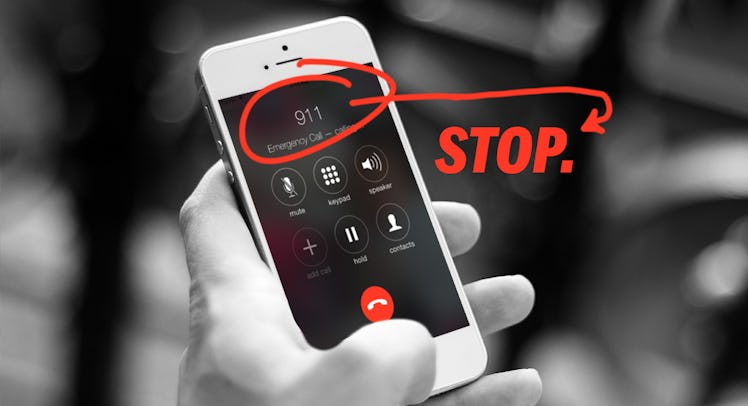Yo Adults, Stop Calling the Cops on Kids!
In recent weeks, busybodies have been making the news for calling the police on kids who were minding their own business. What they should have done was talk to them.

Last month a young woman in San Francisco earned national attention and the nickname “Permit Patty” when she was filmed threatening to call the police on a little black girl selling water on the street. Last week, an Ohio resident called the cops on a black kid with a lawn mowing business who accidentally trimmed a narrow strip of grass on their property. Fortunately, both incidents were resolved peacefully. But recent history has shown that’s not always the outcome when police get called on black kids. Adults would do well to talk to all kids, and particularly kids of color, about their activities before calling the cops. Doing otherwise is irresponsible, cowardly, and ultimately selfish.
It’s no secret that certain adults take a dim view of the activities of children outside the home. Because kids are kids, they have a tendency to be energetic, loud and, at times, careless of boundaries. This can be wildly irritating if you happen to be an adult who believes that kids should “know better.” (If you are an adult who believes this, please reexamine your beliefs.)
But there’s something that feels inherently lazy about an adult who, feeling inconvenienced by a child, calls in armed professionals to solve the problem. These busybodies are bringing several guns to what isn’t even a fight to begin with while creating real risk. They are also behaving as though kids are not, on some level, our collective responsibility — an argument that can be made, but not without being unforgivably callous.
Unfortunately, adults also have a tendency to be frightened of children. That fear can be heightened when the kids come from a different cultural background, with unique cultural norms. Of course, that’s not terribly surprising considering American news media has long sought ratings by confirming adult superstitions with news reports that kids are always up to no good. Just think of the breathless coverage surrounding the so-called Tide Pod challenge that claimed kids were eating laundry detergent on purpose. It was a great story to get the olds to shake their heads and cluck their tongues, but also largely false.
But in their fear and laziness adults forget the power of their age. The fact is that most kids are more than willing to listen to, respect, and even concede to an adult. The trick is that the adult has to approach the situation not as a scolder, but as a problem solver. Because the second an adult comes in hot and angry, fear takes over on both side, cell phones come out, and any attempts at dialogue are immediately aborted.
Consider the hard-working kid in Ohio for whom a dialogue was considered completely unnecessary. How could the 12-year-old Reggie Fields, proprietor of Mr. Reggie’s Lawn Cutting Service, be seen as a threat to anyone? Yes, he did cut a narrow strip of a neighboring property’s lawn. But what, exactly, was the problem? Was his lawnmower too beefy and frightening? Was the neighbor somehow shook after watching the ill-conceived 1992 sci-fi thriller Lawnmower Man? No. Reports are they were simply a busybody who couldn’t walk out their door to speak to a kid so reasonable he calls himself “mister.”
However, approaching a kid to talk and work out a solution is good for everyone. The kid has an opportunity to learn that adults can be reasonable and that solutions can be found in negotiation. The adult has an opportunity to learn that kids can be reasonable and feel less inconvenienced after a resolution is reached.
That’s not always the outcome when police are called in. Yes, some officers are trained to work with kids via specialized training. But recent kid-centered training is a phenomenon built on tragic outcomes from police contact with children. Think of the 2014 killing of 12-year old Tamir Rice, shot down by police in a park. Rice was reported to 911 after being witnessed pointing an airsoft pistol at bystanders. Despite the caller reporting that the gun was probably fake and that Rice was a kid, police took little time on contact to decide end to his life.
Law enforcement is a tool of crisis and they are primed to deal with the problem using every item at their disposal. Sometimes they will use the simple authority of their badge to find a resolution. Sometimes, however, they will use handcuffs, or in the most extreme cases, guns.
Involving police can be particularly terrible where black kids are concerned. That’s true even when police act reasonably and restrained. One recent study in the journal Crime & Delinquency found that when children were stopped and arrested both future delinquency and deviant attitudes were amplified.
That not even taking into consideration the fact that black kids are often primed to fear the police by their own family history, their own personal experiences, or by parents concerned for their well-being. Adding police into a confrontation with a black child will immediately ratchet up the intensity of the situation.
Are there ever situations where police should be called? Sure, it’s never inappropriate to call law enforcement if the child’s health and safety are honestly in danger, for instance. But honestly, those situations should be a rarity.
It’s not overstating the case to say that adults could possibly even save lives if they were to talk before calling the police. At the very least they can help build communities rather than tearing them down.
This article was originally published on